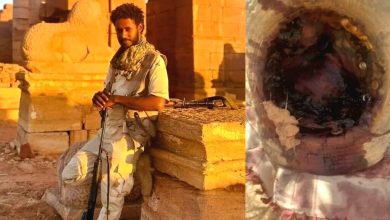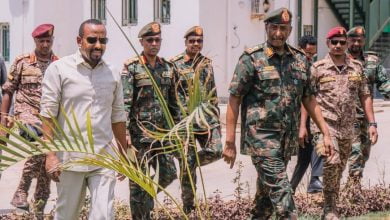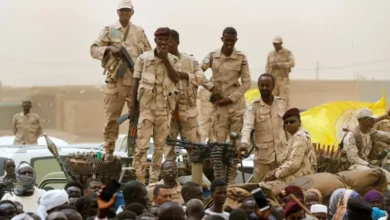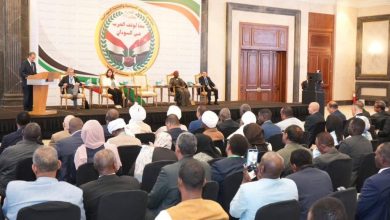Sudan: Banks Reopen as a Step to Revitalize Economic Activity in Khartoum

almohagig – Nazik Shamam
After a full year, three commercial banks have resumed operations in the Sudanese capital, Khartoum, following victories achieved by the Sudanese army in Omdurman, north of Khartoum.
This return is coupled with the stabilisation of security conditions in the area.
The banking system collapsed after the war due to looting and the burning of several banks’ buildings.
The war led to the closure of 70% of bank branches in conflict areas, according to a report by the Central Bank of Sudan, which confirmed ‘the looting of bank assets, properties, and assets.
According to a statement from the Central Bank of Sudan on its official website, banks have been subjected to widespread looting and sabotage since the beginning of the war. The bank pledged in September last year to work on reducing the sector’s damages and addressing the decline in the value of the national currency.
However, the year witnessed dozens of bank branches in central and western Sudan states ceasing operations due to the widening scope of the war and a significant decline in the value of the Sudanese pound.
The return of bank operations has ignited hope among Sudanese people that conditions will be restored to what they were before the war. The list of banks that have resumed operations includes two out of 39 operating in Sudan, namely the Nile Bank and Khartoum Bank, which opened branches in the Hatana and Thawra neighbourhoods.
The Nile Bank stated in a press release, ‘The opening of this branch reflects our commitment to providing the best banking services to our clients under these exceptional circumstances.’ They added, ‘We are proud to be the first bank to kickstart the banking system within Khartoum.’
As for Khartoum Bank, it stated during the opening of its first branch in the Hatana
area on March 7th that the resumption of work comes as part of its efforts to continue providing banking services and expanding public service windows.
The bank’s management confirmed the resumption of work at the bank branch in Omdurman (Thawra Square) starting yesterday, stating in a press release that this comes as part of the bank’s efforts to continue providing banking services and increasing public service windows.
These banks are returning to work under complex economic conditions, the most important of which is the erosion of Sudanese banks’ capital, estimated at around 45 trillion pounds, approximately half, and the closure of more than 70% of branches of banks operating in the country, totalling 39 government and commercial banks. In addition, the value of the national currency against the package of foreign currencies has continuously declined.
A Dangerous Step
Reactions varied regarding the steps of some banks returning to work in Khartoum, and the merchant Mohammed Ahmed Abdul Rahman in the Omdurman market believes that the steps are unsafe because security conditions have not fully stabilised.
He told the almohagig, ‘We must be cautious in making and implementing such decisions because although the Omdurman area is safe, occasional skirmishes make the current security stability incomplete.’
He added, ‘We need some time for things to return to normal and for trust in the banking system to be restored.’
Boosting Activity
Meanwhile, businessman Babikir Ibrahim welcomed some banks returning to work in Omdurman, indicating that the step will help boost stagnant economic activity.
Ibrahim, speaking to the Almohagig, ruled out any adverse consequences of the step, stating that it would work to reinforce confidence in the Sudanese banking system.
He said, ‘Such supportive steps are necessary for economic and social stability in Khartoum state.’
He pointed out that these banks will work to gain the trust of their clients in the long run.
A Media Stunt
On the other hand, an employee at one of the banks – preferring to remain anonymous – described the return of some banks to work as a ‘media stunt.’
He pointed out that conducting banking operations in such circumstances is challenging, indicating that the security situation is still unstable for banking operations to resume.
In his conversation with the almohagig, he questioned how cash could be brought in the absence of a currency printing press and the central bank.
He emphasised that the reopening of banks depends on several steps currently unavailable steps.
An Excellent Step
Economic expert Dr. Mohammed El Nair says that the return of banks in Khartoum State is an excellent step, and we have been demanding that the economic wheel not stop under any circumstances.
He added, ‘Bank branches in Khartoum State were halted during the past period, although the Kordofan region was witnessing stability, and banks should not have stopped operating there at all.’
He continued, ‘We now say, after the full return of Omdurman, banks should open in all of Omdurman.’
El Nair called on the central bank to work with branches of commercial banks in these locations and enable them as quickly as possible so that they can operate. These banks address many fundamental issues of the masses in Khartoum State, especially after the return of the telecommunications network to Omdurman, which facilitates the reopening of banks in the area.
He added, ‘This makes it easier for citizens to receive their remittances and creates a cash abundance because Khartoum has been suffering from a cash crisis recently.’
He stressed the need to support this vision and accelerate its implementation significantly, and the state must work to rehabilitate bank branches and open them as soon as possible. The state must also coordinate with telecommunications companies to secure the communications network in Omdurman and extend it to all cities of Khartoum in the coming period.
He explained that this measure has a positive economic impact that reflects on citizens’ ability to receive services, access bank branches, and obtain the necessary cash to facilitate their daily transactions in Omdurman. It also makes it easier for residents of Omdurman to process their international transfers and arrangements for receiving transfers, whether from within or outside the country.
He confirmed that this helps in the movement of the market, considering that the presence of banks directs commercial activity to deposit funds in banks so that the responsibility for funds is not on commercial establishments. Thus, it serves as a safety valve for the presence of movement in the banking sector, whether through depositing daily imports in banks or supplying citizens’ basic needs.





